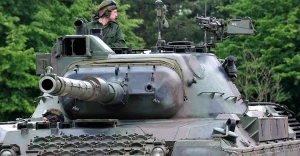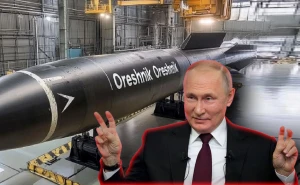
How Putin’s European “useful idiots” promote Kremlin’s narrative in West
Despite facing numerous Western sanctions and condemnations for its actions in Ukraine, Russia continues to maintain a significant number of "friends"
The Insight News cites the Economist which highlights the presence of what it calls Vladimir Putin's European "useful idiots" who propagate the Kremlin's narrative in the Western world, causing harm to Ukraine.
The outlet points out that despite their fundamental differences, far-right and far-left parties are united in their demand for an immediate "peace" in Ukraine, which would effectively reward Russia's aggressive war tactics and legitimize its territorial gains through conflict.
There is cynicism among certain media outlets and intellectuals who downplay Russia's imperialistic intentions. Instead, they prefer to focus on the perception of Europe being drawn into a proxy war between the US and Russia, or a broader geopolitical rivalry between the US and China.
Putin’s circle of friends
According to The Economist, several European governments are part of Putin's circle of friends. Hungarian Prime Minister Viktor Orban is highlighted as one of the most notable cronies of Putin. Orban has frequently criticized Western support for Ukraine, and his government continues to import Russian gas into Hungary. Furthermore, Hungary refuses to allow the transit of weapons provided to Ukraine by its NATO and EU partners.
Austria has also withdrawn from actively supporting Ukraine, citing its non-NATO membership and positioning itself as a bridge between East and West. As a result, Austria has provided limited assistance to Ukraine, despite a significant increase in trade with Russia.
Greece, another EU member, has complied with EU sanctions but has been reluctant to impose tighter restrictions on the transport of Russian oil. This reluctance may be due to Greek firms benefiting from trade with Russia.
Cyprus, under intense pressure from the United States, recently closed around 4,000 local bank accounts held by Russians, but it had previously been lenient in its approach. Non-EU countries like Turkey and Serbia openly provide lucrative backdoor opportunities for Russia without attempting to hide their actions.
Switzerland, citing its neutrality, has used local laws to block arms shipments to Ukraine. It even blocked the shipment of 96 mothballed Leopard tanks, which were found to belong to a private Swiss firm. However, despite the war, Switzerland has continued to purchase gold of Russian origin.
Slovakia has played a crucial role as a conduit for Western aid and recently supplied Ukraine with MiG-29 fighter jets. However, polls indicate that the party led by Robert Fico, a pro-Russian leftist who has accused “Ukrainian fascists” of provoking Putin, is likely to win the September elections.
Recently, a French parliamentary commission criticized Marine Le Pen, a prominent far-right leader and Emmanuel Macron's main rival in the last election, for echoing Russian propaganda following the annexation of Crimea in 2014. Le Pen has consistently denied any connection between her alignment with Putin's political stance and the EUR 9 million in loans her party received from Russian-controlled banks. While she has condemned Russia's invasion of Ukraine, she has expressed skepticism about the effectiveness of sanctions and advocated for immediate peace without calling for Russia to withdraw its troops from Ukraine.
In Italy, Prime Minister Giorgia Meloni strongly supports Ukraine, but Matteo Salvini, leader of the second-largest party in her coalition, opposes sanctions and was an ardent Putin supporter prior to the invasion.
Germany, a reliable partner and supporter of Ukraine, has also faced challenges from the far-right Alternative for Germany party. The country's intelligence chief has explicitly labeled this party as propagating Russian narratives, and their influence is growing according to polls. German far-right groups align themselves with Russian propaganda.
What narratives pro-Putin politicians promote
The narratives propagated by the "useful idiots" evolve around key points such as that NATO supposedly provoked Russia's repeated attacks on Ukraine, leading to its eventual invasion. They also claim that Ukraine is an artificial entity unjustly occupying land that rightfully belongs to Russia. Additionally, they assert that the United States actively fuels conflicts to sell weapons and maintain global dominance.
These ideas find resonance in various ways. One approach is what Italians refer to as “benaltrismo” or “whataboutery.” NATO attacked Serbia in 1999 and Libya in 2011, America invaded Iraq and Afghanistan. Consequently, the "useful idiots" present a rhetorical and cynical question: "What harm is there in Russia's behavior?"
Another variation is “dietrismo,” which suggests that there must be an "inside" story behind events. For example, Wolfgang Streeck, a German sociologist writing in the New Left Review, speculates that the crisis serves the purpose of placing a fearful European Union under the control of a pumped-up NATO.
Another point is Cold War anti-Americanism that links Europe’s far right, far left and “intellectual” opposition.
Tino Hruppalla of Alternative for Germany insists that the allies benefited from the war in Ukraine by forcing Germany to switch from Russian natural gas supplied through pipes to more expensive liquefied natural gas supplied from America. Sarah Wagenknecht, his left-wing ally in pro-Russian views, believes that Washington provoked the war with Russia to draw Ukraine into its “sphere of influence.”
- News














































